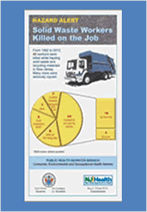
- Home
- Occupational Health Surveillance
- Workers
- Solid Waste and Recycling Workers
Solid Waste and Recycling Workers
 From 1992 to 2012, 43 workers were killed while hauling solid waste and recycling materials in New Jersey. Many more were seriously injured. This Web page provides resources to promote safe work practices in this industry.
From 1992 to 2012, 43 workers were killed while hauling solid waste and recycling materials in New Jersey. Many more were seriously injured. This Web page provides resources to promote safe work practices in this industry.
- Hazard Alerts/Fact Sheets
- Fatality Investigation Reports Related to Solid Waste and Recycling Workers
- New Jersey Haulers Licensing and Regulations
- New Jersey Department of Labor and Workforce Development (NJDLWD)
- American National Standards Institute (ANSI)
- National Waste and Recycling Association (NWRA)
- New Jersey Chapter of the Solid Waste Association of North America (SWANA)
 Solid Waste Workers Killed on the Job (New Jersey) English [pdf 1m], Spanish pdf 209k]
Solid Waste Workers Killed on the Job (New Jersey) English [pdf 1m], Spanish pdf 209k]- City Laborer Dies after Falling Off a Moving Refuse Collection Truck [pdf 120k] (Massachusetts)
- Solid Waste Industry [pdf 1.9m] (NIOSH)
- Preventing Worker Injuries and Deaths from Moving Refuse Collection Vehicle (NIOSH)
- Crushing Hazards Associated with Dumpsters and Rear-loading Trash Trucks (OSHA)
 The NJDOH conducts in-depth investigations of select fatal occupational injuries as part of the Fatality Assessment and Control Evaluation (FACE) Project, with support from the National Institute for Occupational Safety and Health (NIOSH). FACE is designed to identify the underlying causes of work-related fatalities and detect common patterns of fatal injuries in New Jersey. Through FACE Investigation Reports, FACE informs employers and workers of commonly occurring hazardous operations and work practices including recommendations for preventing similar incidents in the future.
The NJDOH conducts in-depth investigations of select fatal occupational injuries as part of the Fatality Assessment and Control Evaluation (FACE) Project, with support from the National Institute for Occupational Safety and Health (NIOSH). FACE is designed to identify the underlying causes of work-related fatalities and detect common patterns of fatal injuries in New Jersey. Through FACE Investigation Reports, FACE informs employers and workers of commonly occurring hazardous operations and work practices including recommendations for preventing similar incidents in the future.
The following are FACE investigation reports related to solid waste and recycling workers who were fatally injured in New Jersey and other states from 1990-2013. All these reports are available on the NIOSH FACE Program Web site by using the search feature. Suggested key words include: refuse truck, trash truck, recycling, garbage truck.
NEW JERSEY
- 69-year-old sanitation worker run over by refuse truck [pdf 171k]
- Recycling collector dies after falling under the wheels of his truck
- 52-year-old public employee dies after being crushed between dumpster and rails of roll-off truck [pdf 243k]
CALIFORNIA
- A laborer dies when struck by a packer panel in the hopper of a rear-loading trash truck [pdf 921k]
- A laborer died when crushed between the forks and the cab of a trash truck [pdf 3.1m]
IOWA
KENTUCKY
MARYLAND
MASSACHUSETTS
MISSOURI
- Intoxicated refuse collector falls off of and is backed over by refuse truck
- Commercial route refuse collector crushed when refuse truck slid into semi-truck trailer
- Refuse collector crushed by refuse truck compactor
- Sanitation worker dies after falling from rear of moving refuse collection vehicle
NEBRASKA
NEW YORK
NORTH CAROLINA
OKLAHOMA
TEXAS
VIRGINIA
*NIOSH in-house report; state never had a FACE project.
 The New Jersey Department of Environmental Protection (NJDEP) Solid and Hazardous Waste Management Program:
The New Jersey Department of Environmental Protection (NJDEP) Solid and Hazardous Waste Management Program:
- Administers the licensing (A-901) of companies engaged in the solid/hazardous waste business
- Registers solid and hazardous waste transporter vehicles and equipment
- Enforces the provisions of the NJ Solid Waste Management and Solid Waste Utility Control Acts
The NJDLWD’s Office of Public Employees Occupational Safety and Health enforces OSHA standards in New Jersey’s public sector. The NJDLWD also offers free on-site consultation to New Jersey private and public employers.
ANSI oversees the creation, promulgation and use of thousands of norms and guidelines that directly impact businesses in nearly every sector: from acoustical devices to construction equipment, from dairy and livestock production to energy distribution, and many more. The following ANSI standards are particularly pertinent to the solid waste industry:
- ANSI/ISEA 207-2011: High-Visibility Public Safety Vests
- ANSI Z245.1-2008: Mobile Wastes and Recyclable Materials Collection, Transportation and Compaction Equipment - Safety Requirements
National Waste and Recycling Association (NWRA): the trade association focused on making trash collection, processing and disposal operations less dangerous by encouraging safety training, assistance for compliance with regulations, company safety rules and policies.
SWANA has made its mission to advance the practice of environmentally and economically sound management of municipal solid waste in North America and provides a forum for solid waste professionals to share information and promote training. SWANA’s technical conferences and training programs cover all aspects of integrated municipal solid waste management, and the Association is a major policy and technical representative of solid waste management practitioners, executives, companies and government organizations.
